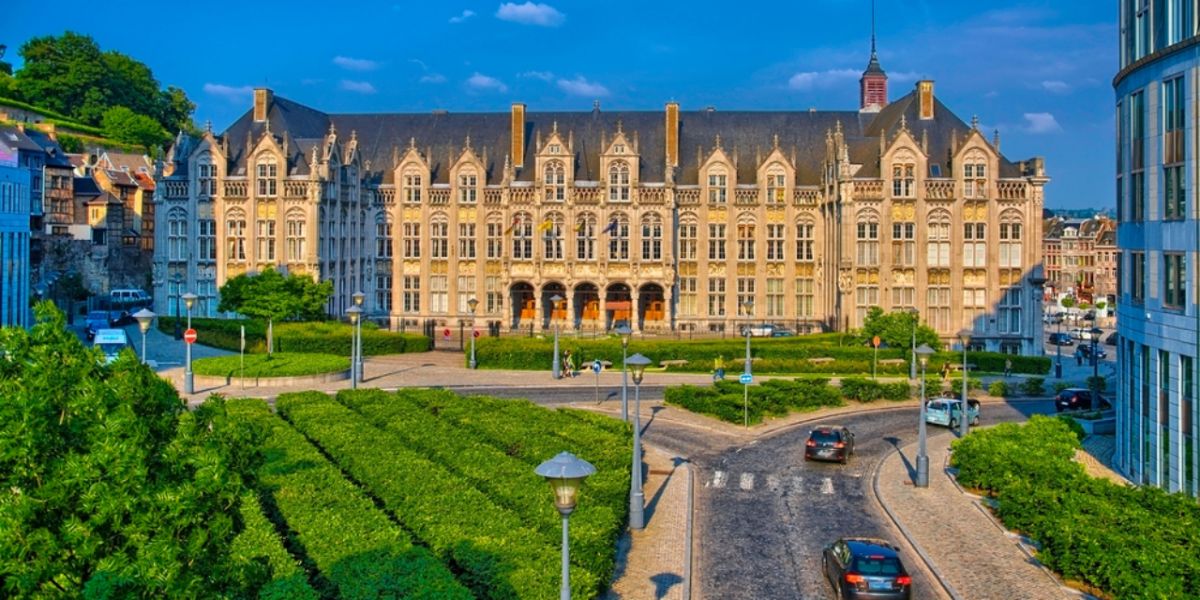
Are you looking for accommodation in Liège? Whether you are a student, a worker, or in transition, this dynamic French-speaking city offers plenty of options: shared flats, studios, houses… Our guide reviews neighborhoods, prices, procedures, and helpful tips for settling in well.
About Liège
Liège is nicknamed "the Fiery City". It is a French-speaking city and the largest urban area in Wallonia. Liège is the economic capital of the region and is home to hundreds of thousands of inhabitants. It is one of the top three most populous cities in Belgium.
Liège is geographically well-positioned as it is not far from the borders of the Netherlands and Germany. It is located in the Meuse Valley, where it meets the Ourthe River.
The districts of Liège
There are 9 different districts in Liège: Angleur, Bressoux, Chênée, Glain, Grivegnée, Jupille-sur-Meuse, Liège, Rocourt, and Wandre. Here's an overview to help you decide where to settle down.
Angleur
This district is located in the southern part of Liège. Right next to Angleur is a small hill, and you'll find the Ourthe River and the Meuse River here. This spot offers a beautiful view.
Well-served by transport (with its own SNCB station), it provides direct access to nature and scientific hubs, especially via the Liège Science Park, making it an attractive place for researchers and students.
Bressoux
Located in the northeast of Liège, Bressoux is an urban district with many tower apartments and a high density of housing. It's a convenient area to live in, well-connected thanks to a station on line 40, facilitating travel to the center or surrounding areas.
Chênée
This district is located at the confluence of the Vesdre and Ourthe rivers. It has a rich history in glass manufacturing, with three main manufacturers in the 18th century. Today, only one remains.
Glain
Glain is located in the southwest of Liège. A former working-class district, it retains traces of its coal mining past. It is well-connected to Brussels by rail and the E40 and E42 highways, making it a convenient area for commuting.
Grivegnée
This is a district to consider if you enjoy urban life: Grivegnée is in the heart of the Liège agglomeration. If you are looking for a lively place but a bit quieter than Liège city center, Grivegnée might just be your favorite spot.
Jupille-sur-Meuse
Beer enthusiast? This district is for you: Jupille-sur-Meuse is home to the famous Jupiler brewery, now part of the AB InBev group. The industrial history of the district doesn't stop there: it also hosted two major paper mills, which marked its economic development.
Liège
Liège is the city center itself, where you'll find all the hustle and bustle of urban life. It is also home to the University of Liège. This means that if you are considering attending university or have children who will soon pursue higher education, Liège is a place to consider living.
Rocourt
Rocourt was formerly known as Rocoux or Roucoux. Today, it is best known for housing one of the largest maternity wards in all of Belgium. If you are considering starting or expanding your family, Rocourt could be a very relevant choice of residence.
The district is also known for its stadium, which hosted RFC Liège between 1921 and 1995. This football club resumed its activities in Rocourt after the construction of the new stadium in 2015.
Wandre
This district of Liège consists of 3 parts: Wandre itself, Souverain Wandre, and La Xhavée. You will also find a hamlet called Rabosée. Wandre is also a region with a rich coal mining past. There are still several storage tanks for petroleum products.
The district is connected to the rest of the city by the Wandre Bridge, which spans the Meuse and supports the E40 (A3) and E25 (A25) highways.
How to find accommodation in Liège
You can get help in your search for accommodation in Liège on specialized websites like Immoweb, Zimmo, or Appartager for shared housing, through newspapers like La Meuse or Vlan Liège, via local real estate agencies like Trevi Liège or Century 21, Facebook groups like "Liège à louer", "Kots à louer Liège", and even from signs posted outside rental properties.
If you already have friends and/or family in Belgium, you can also take advantage of this network. Word of mouth works very well for finding an apartment or house in Liège. So start talking to people, and you can quickly get some interesting contacts.
Before flying to Belgium, we suggest joining online groups, like those found on Facebook. You can browse rental property listings and accommodation options. You can even schedule visits upon your arrival.
The city also has institutions that facilitate connections between landlords and potential tenants: the Maison de l'Habitat, ZIP/QI, and the Social Real Estate Agency Liège Housing. There are also social housing options, but these are only available based on specific personal and family resource criteria.
Types of accommodation in Liège
Temporary accommodation
Upon your arrival in Belgium, you will need a place to stay temporarily while looking for more permanent accommodation. In this specific case, most expats choose to stay in hotels. Fortunately, there are plenty in the center of Liège. They are slightly more expensive, with rates over €100 per night, depending on the time of your arrival.
If you are looking for a more economical option, consider youth hostels like: Liège Youth Hostel, Jeugdherberg Van Luik, Student Hotel, and Chick & Kot. As you might guess, hostels are more geared towards a younger clientele, so it might not suit you. Also, there is much less privacy in these hostels. You usually have to share a room or dormitory with others.
For some, it's a great way to quickly make friends, but most of those staying in hostels will not be residents of Liège; they will be off to their next adventure shortly after. Additionally, you will have to share bathrooms and showers, which isn't always pleasant. In some cases, it might be better to stay elsewhere, especially if you have valuables.
Another option to consider is renting an Airbnb. It's ideal for long stays and allows you to see what real Liège apartments and houses look like. Prices are generally cheaper than hotels, and you can have access to a kitchen, which can help reduce your costs. You can also negotiate with the owner if you need to stay longer.
A similar alternative is aparthotels. There are several in Liège: Aparthotel Liège, Appart-Hotel Léopold Liège Centre, Smartflats Design - Opera, Smartflats City - Perron, Residence Place Saint-Lambert, Appartement Au Cœur de Liège, and Aparthotel Les Éléphants. These establishments allow you to live in an apartment with a kitchenette and a washing machine. Plus, you won't have to do chores since the property is maintained. This can be a relief while you search for more permanent accommodation.
If you want to enjoy Liège's nature, you might also consider camping as a temporary accommodation option. There are several in Liège, but they are all quite far from the city center. It won't always be easy to visit apartments, especially if you're looking for properties to rent near the city center. But on the other hand, it could be a wonderful experience!
Student accommodation
How to secure student accommodation if you are enrolled at the University of Liège?
Be aware that the university has student residences located on its Sart Tilman campus. You can rent rooms temporarily or for an entire academic year. These rooms are available for all kinds of students, including bachelor's degree holders, interns, researchers, and exchange program students.
If you wish to rent a room with the university, note that standard contracts cover 10 months (from September to June), but shorter stays are sometimes possible.
The university gives priority to those enrolling for the first time and those in their first year of a bachelor's degree. So, if you are about to finish your master's, it's unlikely you'll find accommodation on campus, as you'll be at the bottom of the list while demand for dorms is usually high.
If your chances of getting dorm accommodation are low, or if you simply don't want to live on campus, you can always rent a room or apartment from private landlords, just like other expats and Belgian citizens do. Look out for the "kots", which are student rooms. The university provides a kot database, where you can search for potential places.
While you search for long-term accommodation, it might be wise to stay temporarily in a youth hostel. This can help reduce costs before moving into your kot.
Rooms, studios, and houses for rent
As mentioned, living in a room is a viable option, even for non-students. If you don't plan to spend much time at home and need to save money, you can always rent a room, especially if you are single and/or live a minimalist lifestyle. Rooms are usually small; 10 m² (which is the norm) up to 40 m² if you're lucky. More generally, you'll find spaces between 15 and 20 m².
You can also rent a studio. This is a living space that resembles a one-bedroom apartment, but without partitions. The studio is ideal for singles, and it can also be for couples. You will have about 40 to 50 m² to live in.
If you are looking for something more familiar, consider renting a one-bedroom apartment. These apartments have partitions between the kitchen, living room, and possibly the bedroom. They generally measure around 60 m², giving you more space.
Are you moving in with your partner and/or friends? Then a two-bedroom apartment might be better. You will then have 120 m² of living space.
If you have a small family, you should consider renting a house. This will give you at least 120 m² of living space. However, you will most likely have to rent in areas further from the city center to get better prices.
Furnished vs unfurnished Apartments
In Belgium, as in the Netherlands, there is often a particular type of housing: apartments known as "unfurnished shell", which could be translated as "bare walls". They are even more stripped down than typical unfurnished apartments.
Unfurnished classic apartments do not offer furniture, just like "unfurnished shell" apartments (bare walls). However, in the latter case, the apartment will also not be equipped with appliances, such as a stove, oven, washing machine, or refrigerator. Moreover, the property will not have carpets, curtains, or light fixtures. It will literally be an empty "shell" that you will have to furnish yourself.
This means you will have to equip everything yourself: from the oven to the light fixtures. It is a constraint at the start, but a good investment in the long term, as you can reuse your equipment in future housing.
Rental prices in Liège
Rooms are the cheapest to rent. You can generally find them costing between €500 and €600 per month.
If you can stretch your budget a bit, we suggest opting for a studio. This will cost you between €750 and €900 per month, on average. Not only will you get more space, but you will also benefit from your privacy. It is somewhat a better value for money.
For apartments, a one-bedroom will cost about €850 per month, while a two-bedroom will cost you about €1,150 monthly. And to rent a house in Liège, it will cost you over €1,200 per month. This rent is for areas far from the city center; if you rent in the city center, the price will surely be significantly higher.
Real estate rental in Liège
The rental process in Liège is quite similar to what exists in most regions of the country.
If you find a property you like, don't hesitate to contact the owner by phone. This is the usual way of doing things in Belgium, although nowadays, email is also accepted.
The owner has the duty to describe the property to you in detail, and if you are interested, you have the right to schedule a visit. During the visit, you should make sure to examine every inch. Don't be afraid to ask the owner questions. They should have nothing to hide.
After your visit, you can then ask to sign a rental contract if you wish to move in. This must be done in two copies, signed and dated by the owner and you. You will also need to draw up an inventory together. This document will serve to compare the property's condition when you move out. If there is damage compared to the original condition of the property, you will pay for repairs from your security deposit.
Note that in Belgium, it is the owner's responsibility to register your rental contract within two months of signing the contract. If they still haven't done so one month after the two months, you will be legally allowed to leave without notice or compensation. However, under normal circumstances, you will still need to give at least three months' notice before moving out.
We do our best to provide accurate and up to date information. However, if you have noticed any inaccuracies in this article, please let us know in the comments section below.








